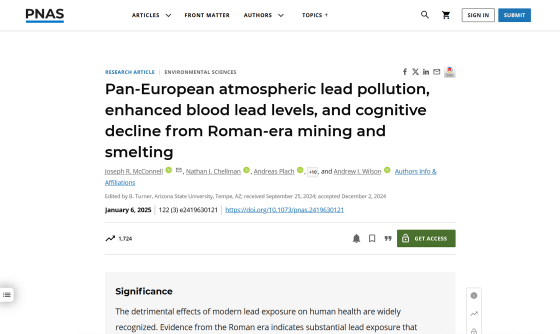Research results show that 'atmospheric lead pollution' by ancient Rome caused people's IQs to decline

Pan-European atmospheric lead pollution, enhanced blood lead levels, and cognitive decline from Roman-era mining and smelting | PNAS
https://www.pnas.org/doi/10.1073/pnas.2419630121

Lead pollution likely caused widespread IQ declines in ancient Rome, new study finds | EurekAlert!
https://www.eurekalert.org/news-releases/1069309
Roman Empire's Air Pollution May Have Lowered The IQ of Europe : ScienceAlert
https://www.sciencealert.com/roman-empires-air-pollution-may-have-lowered-the-iq-of-europe
Lead is known to have various adverse effects on human health, and lead poisoning can cause damage to the nervous and cardiovascular systems, and children with high blood lead levels are known to have lower IQs. The World Health Organization claims that 'there is no known safe blood lead level,' and states that blood lead levels of as low as 3.5 μg/dL are associated with reduced intelligence and behavioral and learning disabilities in children.
In the past, leaded gasoline was used as automobile fuel, but in the mid-20th century, the harmful effects of leaded gasoline came to be widely known. In response to this, Japan completed the switch to unleaded gasoline in the 1970s and 1980s, and in 2021 it was banned in Algeria, the last country to sell leaded gasoline. As a result of these regulations, people's blood lead levels have decreased, and the average blood lead level of children living in the United States today is around 0.6 to 0.8 μg/dL .
However, in ancient Rome, the harmful effects of lead were not well known, so syrup containing lead acetate (II) was used to sweeten wine and preserve fruit, and lead was also used in water pipes. As a result, it is said that there were chronic cases of lead poisoning in ancient Rome.

The team, including researchers from the Desert Institute in the US and the University of Vienna in Austria, analysed Arctic ice cores to measure levels of lead pollution in the air from 500 BC to 600 AD, a period spanning the rise of
The study found that atmospheric lead pollution levels rose sharply between the late 1st century BC and the late 2nd century AD. The research team believes that this large-scale lead pollution was caused by silver mining and smelting, which supported the ancient Roman economy, and estimates that as much as 500 kilotons of lead were released into the atmosphere over a period of about 200 years.
Using data on lead pollution and atmospheric modeling, the authors found that air pollution in ancient Rome affected the whole of Europe, raising children's blood lead levels by about 2.4 μg/dL, which led to widespread cognitive decline and an estimated drop in IQ of 2.5 to 3 points.
'A drop of two or three IQ points doesn't seem like a big deal, but when you apply it to the entire European population, it becomes a big problem,' said study co-author Nathan Chellman of the Desert Institute.

Related Posts:
in Science, Posted by log1h_ik







